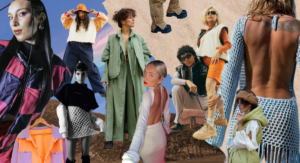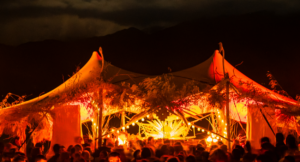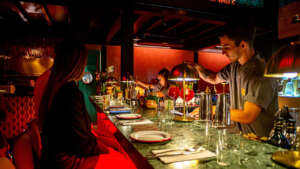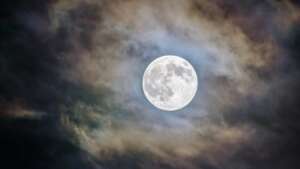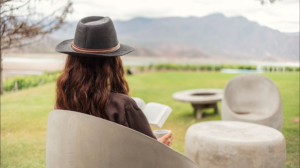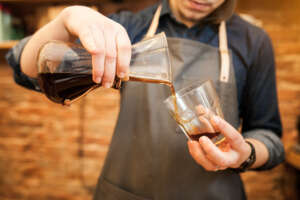«I took the decision to live according to my desires,» says Daniel Rueda haltingly, across his desk in a warm afternoon of June, moved by emotion and some changes in his life. On account of the two sons from Haiti, that after five years of therapy and bureaucracy, he finally managed to adopt, and as it’s been a decade since he is a marchand, curator and cultural consultant. In his office on the 8th floor of a modern building, Daniel Rueda prepares coffee and takes out from a small box two bars of Kinder chocolate. He opens his bar and shows surprise by some personnel questions I ask him.
«I was born in General Alvear, I am the youngest of three children of a Sanrafaelino dedicated to viticulture and an alvearense mother» is the way this lawyer introduces himself who at 35 left his professional duties to find refuge in a new activity, linked to the dissemination and commercialization of art. Three years ago he opened an art gallery where he deals with artists, entrepreneurs and collectors to carry out exhibitions, participate in visual art fairs around the world, and intercede in the sale of works. In 2015, Daniel Rueda opened two art spots: one in Villa La Angostura, Neuquén, and another in Bodega Andeluna in the Uco Valley. In 2013, the gallery was awarded at the art fair EGGO as «Best proposal by the public ‘in the Recoleta Cultural Center and selected by the Aztec press as Top 5 in the Affordable Art Fair in Mexico. «I have no formal training in art, but I learned the job. So I always ask not to call me «curator» because that requires academic training and in some cases, of some arrogance. I am a valid intermediary. Noblesse oblige, I like to recognize as mendocinian curators to Laura Valdivieso, Marcela Roxana Jorajuria or Marcela Furlani » he explains. As a child he played the piano, he collected stamps and still he considers himself a passionate of memories: «I have photographed all my life, from 1970 till now, with albums organized in chronological order.»
He loves to cook. His star dishes are paella and rabbit in coconut. He also likes to innovate, open the refrigerator and create a recipe based on the available ingredients. He defines himself as vehement and he doesn´t overlook being a Capricorn. He worked as an account executive at City Bank («sells have always seduced me a lot»). In 2005 he closed his law-firm, he sold the car and left after organizing an exhibition for Chandon to Uruguay, willing to coordinate the opening of a gallery in Punta del Este.
At age 9, he met the great painter Orlando Pardo during an exhibition in General Alvear, who he contacted decades later when he decided to approach art professionally. «Orlando Pardo is a trigger in my life. We are the product of a sum of elements and my sensitivity to music through the piano and drawing, the nobility my parents transmitted through their work in viticulture, adding my participation in Rotary International, from 14 to age 26, gave me a training which was later manifested».
-When did your interest in art manifest?
‘Ten years ago, when I was working for the Bar Association I was given the opportunity to manage the Cloy Patiño Correa room. I was the secretary of the Bar and I was able to organize amateur exhibitions until I decided to professionalize myself and I presented a project to Bodegas Chandon. After being accepted, we conducted a virtual exhibition with over 500 participants. I realized that through this work I could channel my interest in cultural management, applying what I had learned while working in the Rotary International, which generated passion in me and I had responsiveness from the public. From the beginning I started with an international perspective knowing that Mendoza was my base; then, opportunities arose in Punta del Este, Marbella, Germany, and Holland.
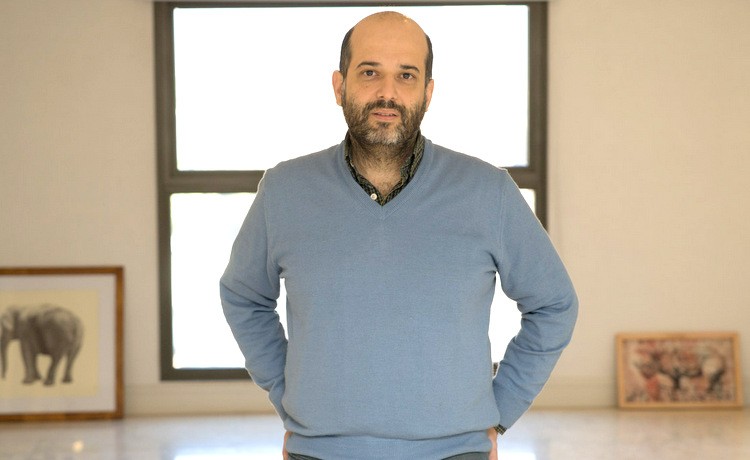
-Why did people trust you?
‘I think they saw in me a serious person; I’m an honest business man and in ten years of cultural management I have never had a problem of liquidation of an artwork or conflict with the artists. We have stopped working with some but because we want to follow different paths. (Silence). For me professionalization is essential. There are some problems that Mendoza has. It’s a society that resists.
-To what?
Fear of change, to the visual arts, but I think that the same happens with many other disciplines. I think that we, mendocinians, sometimes keep signs and it’s difficult to make a clean break… We say we are conservative and there are more than one that is not. We don’t allow ourselves leave landscaping because we represent the argentine school of landscaping, but that does not mean we can’t have other opportunities. That ends up playing against us. On the one hand the mendocinian always wants to have the opportunity to make businesses but he doesn’t want to bet for investment. A lot of factors must apply to find a suitable investor for a play.
-Which factors?
First of all, you have to like it, but if you also want to be a good investment, you have to take into account the authenticity of the artwork, the artist’s profile and impact added to other factors that lead to a fair price. Going back to the idea of professionalism, I believe that through my academic education and my experience to channel them in a profession I finally conceived.
– How do you define yourself, a marchand?
Marchand, absolutely yes, in French: a person who deals with art. I think I’m a valid interlocutor who cares about helping the artist to remain on the level of creativity. There are artists who have the power to market their own work, but there are others who don’t like that and need a third person. As a gallery I have a staff of artists that I represent and work for. I also take care of national and international efforts, I advise art collectors and I seek to put artists on the map, to enter museums in the country and the world.
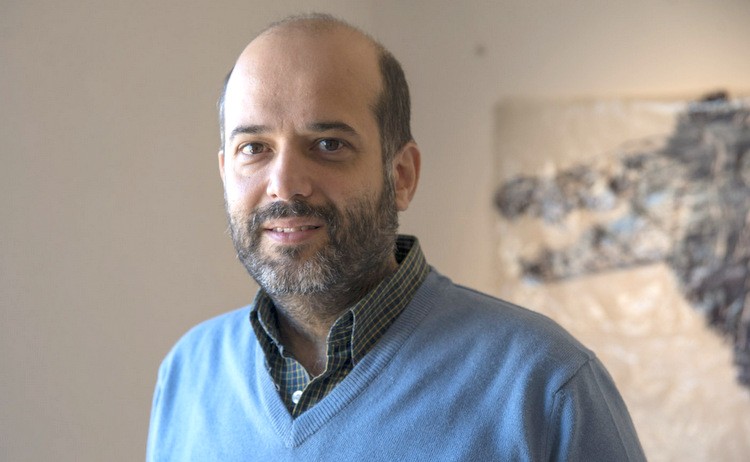
–Do you feel that you occupy a place that was empty in Mendoza?
Absolutely, and it is extremely unpleasant. One doesn’t do this waiting for the recognition of an artist but looking for a public able to appreciate an artwork. I’ve been called by ladies who did a course, painted three pictures and wanted to know if I could represent them. Can you imagine? I´ve written poems and prose and that’s not a reason for calling a publisher to publish me. Now, if I meet an artist who wonders me, I can assure you that I’ll do my best to integrate him as a member of my staff.
–Do you recognize other marchands in Mendoza?
No, unfortunately I don’t.
–Why do you think so? What is missing?
I think people don’t take risks. I can speak for myself as I do roll the dice. I like to speak for Mendoza in the visual arts, I feel proud of representing the place where I come from because I genuinely do it from my heart, although it sounds romantic.
[divider]The decision to be a parent [/divider]
You have recently adopted two little boys. How do you live the paternity?
It was a personal choice, it’s a single-parent adoption and was conducted in Haiti. They are two brothers. I’m sure that in time I will be able to talk more about it, but now is not the moment. I need a few more months to share more information about it. Five years ago I chose to become a father and I prepared myself a lot for this. Today I have the possibility to have two wonderful children … I adopted abroad due a temporal issue: I tried and I asked for counseling to do it here, but realizing the times of each country, I opted for an international. The boys are already enrolled in school and we’re three are very happy.
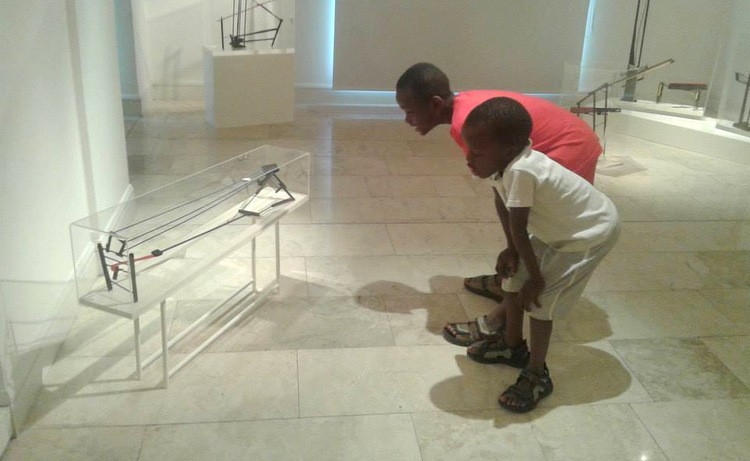
How do you organize your time with work and the kids?
‘I wake up at 6:30, make breakfast, clothes and leave to school. They go to a public school, they are in first and second grade. I try to do everything in the morning; today, for example, I have a meeting in the afternoon, their grandmother, who is 80, helps me and my sister, who is delighted with her role as aunt, too. They speak Creole, french and English creole, because they lived in a dependent evangelical church orphanage. By now we speak in Spanish. Since they arrived I fully dedicated to them, we do homework together and I am very happy because the older one is already reading. They love to sing, they sing a lot!
–What do you hope for the future?
Be a good dad. I am living a transition of viewpoints, but everyone told me it was going to happen. Before I got angry about things that now seem superficial. As for the gallery, I have the desire to reformulate the concept for 2016 to be more suited to the times. Now, everything is more meaningful, I have more desires to grow, I find much sense to all. As a parent I’ve always dreamed to hear people saying: «Let’s go to my dad’s gallery».
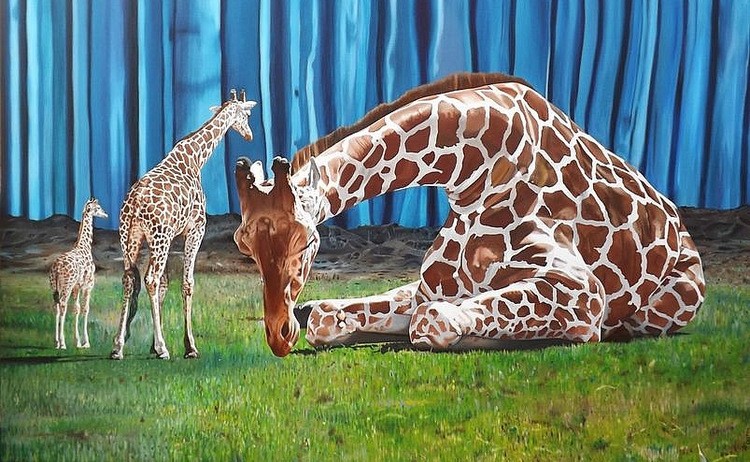
[alert type=blue ]Daniel Rueda presents Juan Castillo in his space. The exhibition will be inaugurated on June 17th, and will remain opened until July 31st . Previous appointment is required. Paintings, engravings and paintings make up the selection of the mendocinian artist. Contact: [email protected] [/alert] [authorbox authorid=»29″ title=»123456789″]
